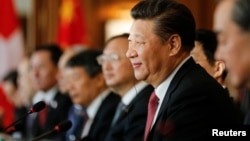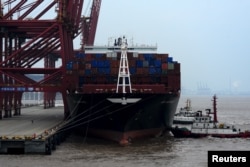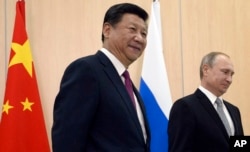President-elect Donald Trump's hints ties with Moscow could improve after he assumes office has been a source of controversy and heated debate in the United States. And that is unlikely to go away after his inauguration later this week.
Across the Pacific, in China, it is an increasing source of hand-wringing and worry for Chinese officials because some believe if ties between Russia and the U.S. improve that could only be bad for Beijing.
“In the West, people have been extremely concerned about Russian involvement in the U.S. elections, and Trump’s commitments, but very few people take seriously the idea that he could lure Russia away from the partnership with China,” says David Kelly, research director at China Policy, a research group in Beijing.
“In China, it’s taken much more seriously and is a subject of daily speculation.”
Scales tipping
At influential think tanks in Beijing and in state media publications online it is clear many are concerned.
Chinese state propaganda outlets have been playing up ties between Russia and China, and playing down the possibility of some sort of U.S.-Russia rapprochement.
Articles argue that while Moscow and Washington might be able to find some common ground on issues such as Syria and the need to work together to fight Islamic State, deciding how to divide up power after the conflict was over would not be as simple.
One long article on China Russia relations in the People’s Daily, under the pen name Zhong Sheng, which is seen as reflecting the views of high-ranking party officials, noted what it calls the “ballast role” Beijing-Moscow ties play in global affairs.
At the same time, however, there is concern that the scales could be tipping away from Beijing’s favor and in a direction that could further challenge China’s regional and global ambitions.
Three kingdoms
Kelly notes that there is a cultural tendency in China to view diplomatic relations in terms of triangular relationships. That, he says, traces back to the popular Chinese novel, Romance of the Three Kingdoms.
One of the many strategies the novel popularized was that in a three-way struggle, you generally want to be two against one and not the one who is the odd man out.
“It’s something that people understand, like an Olympic event,” he added.
If President-elect Trump can find a way to move beyond sanctions and smooth over ties with Moscow, Beijing could end up on the weaker side of the triangle. From Beijing’s perspective that would not be good, especially at a time when China is looking to forward an ambitious trade agenda for the region and Europe, and struggling under the pressure of a slowing economy.
Stephen Blank, a senior fellow for Russia at the American Foreign Policy Council says that for many in China, closer U.S.-Russia ties implies that relations between Beijing and Moscow would be affected.
"There is a lot of anxiety in Beijing that Russians who have all along taken an anti-U.S. stance may start to think differently," said Blank.
Until now, "the China-Russia relationship has been based in a large measure on their rejection of U.S. interests in the global order. This would be affected if there is improvement in U.S.-Russia relationship,” he noted.
Temporary partner?
Ever since Russia’s invasion of Crimea, relations between Beijing and Moscow have been improving. Sanctions cut Moscow off from Western markets and investment and opened the door for Beijing to step in and grow ties. Chinese President Xi Jinping has invested much political capital into the relationship with Vladimir Putin, making a state visit last year.
Trust between the two, however, has never been easy.
Social media blogs and online commentaries about Russia are often skeptical of cooperation between the two countries.
A recent report that Russia had welded shut the engines of Sukhoi-35 fighter jets it sold to China had some enraged. So much so that some were arguing online that it was Russia, not America, that was China’s main adversary.
Global Times opinion writer Gao Fei, the director of the Russian Research Center at China’s Foreign Affairs University, stepped in to calm the masses, asking who benefits the most from sabotaging China Russia relations. He also noted that with any commercial deal comes “legal and other safeguards against IP theft.”
Although Chinese opinion writers have been talking up the crucial role the two play in global affairs, they have also openly worried about the political ambitions of Putin, noting that Moscow may be just a temporary partner.
And that stretches back to even before Trump was elected.
Saibal Dasgupta also contributed to this report.






